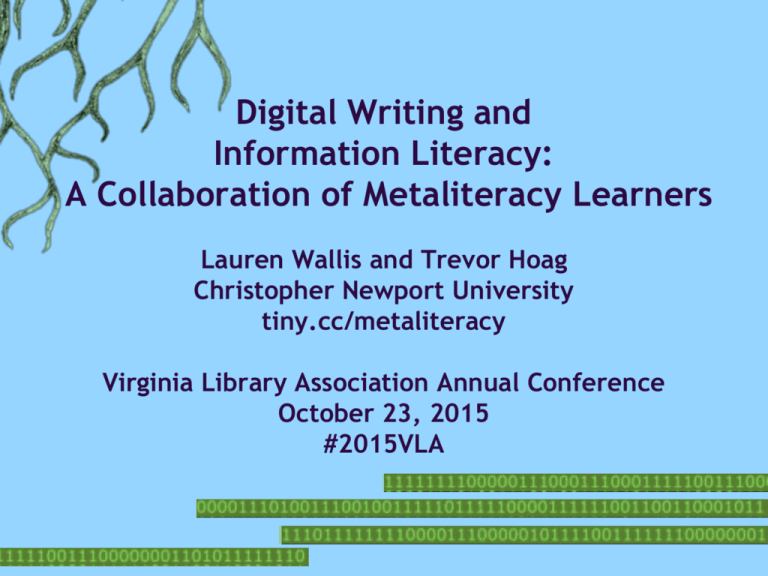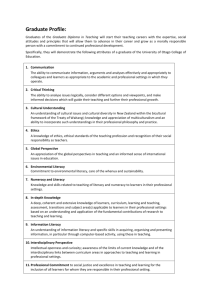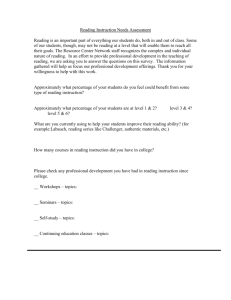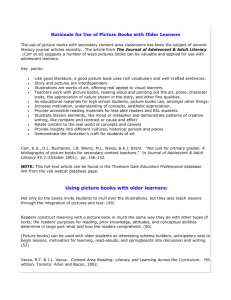VLA 2015 Wallis Hoag
advertisement

Digital Writing and Information Literacy: A Collaboration of Metaliteracy Learners Lauren Wallis and Trevor Hoag Christopher Newport University tiny.cc/metaliteracy Virginia Library Association Annual Conference October 23, 2015 #2015VLA Session Goals ● Discuss the ACRL Framework and collaboration ● Describe the application of metaliteracy in a First Year Writing course ● Identify strategies for moving toward organic, expansive metaliteracy-based collaboration Metaliteracy ● Expands IL to recognize the importance of digital environments. ● Traditional: Find, Evaluate, Use ● Expanded: Collaborate, Create, Share ● Foregrounds affective and metacognitive practices ACRL Framework Authority is Constructed and Contextual Searching as Strategic Exploration Scholarship as Conversation Information Creation as Process Information has Value Research as Inquiry Framework Dispositions Authority is Constructed and Contextual Example Disposition: “Learners who are developing their information literacy abilities question traditional notions of granting authority and recognize the value of diverse ideas and worldviews.” How do you feel about the ACRL Framework and its grounding in metaliteracy? A. Excited B. Somewhat interested C. Neutral D. Negative How much do you think the Framework will change IL instruction at your institution over the next year? A. Not at all B. Slightly C. Significantly D. Completely Framework in Practice ● Local learning outcomes ● Need for intensive faculty involvement ● Mandate or conversation? ● Pre-Framework collaboration models ● Digital Writing and Information Literacy Initiative First Year Writing Course ● Flexible departmental goals ● Metaliteracy intervention: Writing in open, participatory online spaces ● Discussion topics ● Writing assignments and librarian involvement Authority and First Year Writers Building students’ authority: ● Producing sophisticated arguments ● Analyzing challenging texts ● Considering audience Inhibiting students’ authority: ● Limited audience ● Mimicking scholarly writing without being a part of the conversation Authority and First Year Writers On Empowered Authorship: “Often it requires students to throw almost two-decades’ worth of imposed authority into question before they realize they can be contributing members to information structures.” -Carrie Donovan and Sara O’Donnell Metaliteracy Goals 1) Evaluate content critically 2) Understand information ethics issues 3) Share information and collaborate in a variety of participatory environments 4) Connect classroom learning with lifelong learning Information Autoethnography ● Use of genre of autoethnography ● Focus on interactions with information through fieldnotes ● Engage in metacognition ● Write a blog post that connects personal experiences to larger social/cultural issue Metaliteracy English Dept. Goal 3: Share info and collaborate in participatory environments ● Effectively communicate personal experiences to inform and assist others ● Recognize that learners can also be teachers ● Value user-generated content ● See oneself as a producer and consumer of info ● Analyze and produce sophisticated arguments that position their views within ongoing social and cultural questions Acting as Learners and Teachers Student 1 Student 2 ● Personal experience with filter bubble ● Argues it is positive and gives her control over online content ● Personal experience with race issues ● Argues that it is impossible for her not to see race issues everywhere, an experience that is much different than most of her classmates ● Instagram Example: “The accounts I follow don’t tell girls to starve themselves. Instead of having to deal with users and accounts that make me feel insecure about my body, I get to follow these accounts and filter out the bad ones.” ● “Everything I see and hear talks about race, so I’ll give the world what it wants, my experience and the brutal truth.” Valuing User-Generated Content Student 1 Student 2 ● Values UGC as a way to improve her life ● Instagram as inspiration for healthy lifestyle ● Twitter and Facebook as means to connect with family and friends ● Using Pinterest to set goals for the future ● Values UGC as a way to stay educated about issues of race in America ● Following “Twitter War” about Viola Davis after Emmys ● Using YouTube to learn about psychology experiments related to race issues Acting as Producers and Consumers Student 1 Student 2 ● Positions herself mostly as a consumer of UGC ● Positions herself only as a consumer of UGC ● Only act of production is on Pinterest, not meant for wide audience ● Discusses issues of race in informal, face-to-face context with friends Acting as Producers and Consumers Student 3: “I tend to have my phone in my hand if I am ever waiting for someone or eating alone. It’s as if it’s my only friend when there isn’t anyone around I actually know. And the crazy part is that I rarely post anything...I just look at what everyone else is posting. For me the internet is a one way street and traffic is heading in my direction.” Rhetorical Analysis and Wikipedia ● Choose a topic for a Wikipedia entry ● Conduct a rhetorical analysis of a source for the Wikipedia entry ● Write a Wikipedia entry and reflect on embedded values in all pieces of information Metaliteracy Goal 1: Evaluate Content Critically Evaluate author’s goals/purpose Recognize that values and beliefs are embedded in all information English Dept. Read and discuss challenging texts, evaluating text styles, conclusions, and evidence Incorporate multiple print and electronic resources into writing Evaluating Goals and Purpose Recognizing Embedded Values ● Wikipedia Entry ● What does it mean to try to produce “neutral” information? Challenges ● Students’ acceptance of position as creators of digital information ● Faculty acceptance of digital pedagogy and participatory online spaces for learning ● Easy erasure of information literacy in digital pedagogy Expanding the Collaboration ● Informal meetings with faculty interested in digital pedagogy across departments ● Collaboratively building web presence ● Shared lesson plans and instructor contracts ● Digital classroom working group ● Sharing results of First Year Writing class Questions? Contact Us: lauren.wallis@cnu.edu trevor.hoag@cnu.edu tiny.cc/metaliteracy Resources Donovan, C., & O’Donnell, S. (2013). The tyranny of tradition: How information paradigms limit librarians’ teaching and student scholarship. In L. Gregory & S. Higgins (Eds.), Information literacy and social justice (122-139). Sacramento: Library Juice Press. Ellis, C., & Bochner, A. (2000). Autoethnography, personal narrative, reflexivity. In N. Denzin & Y. Lincoln (Eds.), Handbook of qualitative research (733-769). Thousand Oaks, CA: Sage Publications. Mackey, T., & Jacobson, T. (2014). Metaliteracy: Reinventing information literacy to empower learners. Chicago: ALA. Resources Metaliteracy.org ACRL Framework Vortext First Year Writing Blog DWILI Website Plickers Genius







